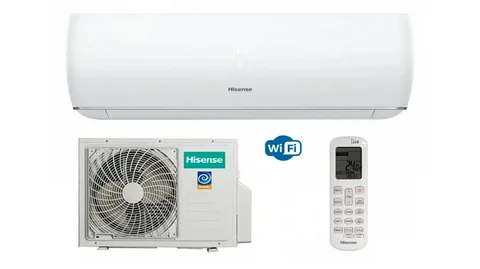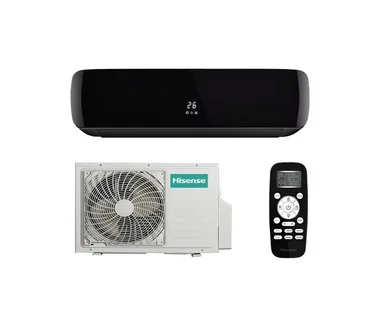In the quest for a more sustainable future, renewable energy has emerged as a pivotal solution. However, the electricity generated from renewable sources often comes in a direct current (DC) form, which needs conversion to alternating current (AC) to power most household appliances and gadgets. This is where the importance of the Dc inverter comes into play. Dc- inverters are essential devices that transform renewable energy into a form that can be used for everyday applications, enabling households and businesses to harness the full potential of solar panels, wind turbines, and other renewable sources.
What Is a Dc- inverter?
A Dc- inverter is a device designed to convert direct current (DC) electricity into alternating current (AC) electricity. This conversion is essential because the majority of electrical appliances and devices in homes and industries are powered by AC electricity.
Renewable energy systems, such as solar panels and wind turbines, typically generate DC electricity, necessitating the use of a Dc- inverter to make this energy compatible with the existing AC infrastructure.
By performing this conversion, Dc- inverters enable the integration of renewable energy into the power grid, as well as direct use in residential and commercial settings. Different types of Dc- inverters are available, each tailored to specific applications and efficiency requirements, making them a versatile solution for various energy needs.
Types of Dc- inverters
Dc- inverters come in various types, each designed for specific applications and efficiency levels. The most common types include:
- These inverters provide clean and stable electricity, making them suitable for sensitive electronics like computers and medical equipment.
- A more economical alternative, these inverters are suitable for less sensitive devices such as simple power tools and household appliances.
- The simplest and least expensive option, square wave inverters are generally used for basic applications where precision is not critical.
- Specifically designed to feed power directly into the electrical grid, these inverters are ideal for solar panel systems integrated with the grid.
- Used for systems not connected to the grid, these inverters are often paired with battery storage to provide a reliable power source in remote locations.
- Combining the features of both grid-tie and off-grid inverters, hybrid inverters offer the flexibility to operate in either mode, making them versatile for a range of energy needs.
Applications of Dc- inverters
Dc- inverters are pivotal in various applications, transforming renewable energy into usable power. The following subheadings detail their diverse uses:
Residential Solar Power Systems
In homes with solar panels, Dc- inverters convert the generated DC electricity into AC to power household appliances. This ensures that renewable energy can be seamlessly integrated into daily life.
Commercial Renewable Energy Solutions
Businesses utilise Dc- inverters to manage larger solar or wind power installations. These inverters support higher power loads, making them ideal for office buildings and industrial settings.
Recreational Vehicles (RVs)
Dometic- inverters and similar devices provide reliable power for RVs. These inverters convert DC from the vehicle’s battery into AC, allowing travellers to use standard electronic devices on the go.
Off-Grid Power Systems
In remote locations without access to the electrical grid, Dc- inverters paired with battery storage systems provide a dependable power source for homes, clinics, and other facilities.
Marine Applications
Boats and yachts often use Dc- inverters to convert power from onboard batteries into AC, enabling the operation of navigational equipment, lights, and kitchen appliances.
Emergency Backup Systems
Dc- inverters are crucial in backup power systems, converting stored battery power into AC during power outages, ensuring critical devices and systems remain operational.
DC to AC Inverter: A Detailed Insight
A DC to AC inverter is an indispensable component in renewable energy systems, facilitating the utilisation of DC electricity produced by solar panels or wind turbines in conventional AC devices. These inverters vary in capacity and efficiency, accommodating different power loads from small residential setups to large commercial installations.
High-quality inverters ensure minimal harmonic distortion, delivering clean energy suitable for sensitive electronics. Advanced models incorporate features such as real-time monitoring and control, enhancing their operational efficiency and reliability.
The selection of an appropriate DC – AC inverter depends on factors like power capacity, waveform output, and compatibility with the renewable energy source, ensuring optimal performance across diverse applications.
How Dc- inverters Work?
Dc- inverters function by converting direct current (DC) electricity into alternating current (AC) electricity through a series of electronic processes. Initially, the DC input, often sourced from solar panels or batteries, is switched at high frequencies to generate a square wave. This square wave is then processed through filtering circuits to produce a sine wave, which is compatible with standard AC devices.
Advanced Dc- inverters incorporate sophisticated algorithms and filtering techniques to ensure the output is stable and meets the quality standards required by the power grid. This complex conversion process allows for the efficient and safe use of renewable energy across a range of applications.
Benefits of Using Dc- inverters
Dc- inverters maximise the use of renewable energy by efficiently converting DC electricity into AC, reducing wastage and improving overall energy consumption.
Compatibility with Modern Appliances
By converting DC to AC, these inverters ensure that energy from renewable sources can power a wide range of household and industrial appliances, which typically run on AC electricity.
Stability and Reliability
High-quality Dc- inverters provide a stable and reliable power supply, essential for the seamless operation of sensitive electronics and critical systems.
Flexibility in Energy Solutions
Dc- inverters offer versatility in various applications, from residential solar power systems to commercial renewable energy solutions and off-grid setups.
Environmental Impact
By enabling the effective use of renewable energy, Dc- inverters contribute to reducing greenhouse gas emissions and dependence on fossil fuels, promoting a greener and more sustainable future.
Cost Savings
Efficient energy conversion leads to lower electricity bills, making Dc- inverters a cost-effective solution for both households and businesses aiming to reduce their energy expenses.
DC to AC Power Inverter: Key Features
DC to AC power inverter come equipped with an array of features that enhance their functionality and efficiency. High conversion efficiency is a standout attribute, ensuring that a maximum amount of direct current (DC) is transformed into usable alternating current (AC). Low Total Harmonic Distortion (THD) is another critical feature, providing clean power that is safe for sensitive electronics such as medical equipment and high-end audio systems.
Robust design elements enable these inverters to perform reliably in harsh environments and across varying temperature ranges. Advanced monitoring capabilities allow users to track performance metrics and energy production in real-time, providing valuable insights for optimising energy use.
Additionally, some models offer remote access features, facilitating control and monitoring from a distance. These key features collectively make DC – AC power inverters a vital component in both residential and commercial renewable energy setups, enhancing the overall efficiency and reliability of the energy conversion process.
Choosing the Right DC – AC Power Inverter
Selecting an appropriate DC – AC power inverter requires a careful evaluation of several key factors. Firstly, power capacity is crucial; the inverter must support the combined wattage of all connected devices. High efficiency ratings are also essential to minimise energy loss during the conversion process.
Compatibility with the specific renewable energy source, such as solar panels or wind turbines, should be verified to ensure seamless integration. Additional features like real-time monitoring, remote access, and robust safety protections can enhance functionality and user experience.
Budget considerations are also important; balancing cost against the quality and features of the inverter will help find the best value solution. Overall, taking these factors into account will guide the selection process, ensuring that the chosen inverter meets the specific needs of the application and operates efficiently within the renewable energy system.
Dometic Inverter: An Overview
The Dometic inverter is highly regarded for its efficiency and dependability in converting direct current (DC) power into alternating current (AC). It is specifically engineered to cater to both mobile and stationary applications, making it a versatile choice for a wide range of energy needs.
Ideal for recreational vehicles, boats, and off-grid setups, Dometic- inverters are designed to deliver robust performance even in challenging conditions. These inverters feature user-friendly interfaces, which simplify the operation and monitoring of the device.
Built to withstand the rigours of various environments, Dometic- inverters offer a reliable power source for those seeking a portable and dependable solution. Advanced models may also include features such as real-time performance monitoring and remote access capabilities, further enhancing their utility and convenience.
Installation and Maintenance of Dc- inverters
Proper installation and maintenance are critical for the optimal functioning of Dc- inverters. Professional installation is strongly recommended to ensure compliance with electrical standards and to minimise potential risks. Once installed, maintaining the inverter involves routine checks and servicing to sustain its efficiency and longevity.
Additionally, updating the firmware periodically can enhance performance and introduce new features or improvements. Regular monitoring of the inverter’s performance metrics, such as input and output voltages, can help identify any deviations that may indicate underlying issues.
Conducting these checks at regular intervals allows for early detection of potential problems, ensuring that the inverter operates reliably and efficiently. Following the manufacturer’s guidelines for both installation and maintenance can significantly extend the life of the Dc- inverter, providing a dependable solution for renewable energy conversion.
Conclusion
Dc to ac inverter play a critical role in the seamless integration of renewable energy sources into everyday life. By converting direct current (DC) electricity into alternating current (AC), these devices enable the use of solar panels, wind turbines, and other renewable energy systems to power household and industrial appliances. Various types of Dc- inverters cater to different needs, ranging from residential setups to commercial and off-grid applications. The ability of these inverters to provide clean, stable electricity makes them indispensable for sensitive electronics and critical systems. Advanced features like real-time monitoring, high conversion efficiency, and robust safety protections further enhance their utility.
FAQs
What is the primary function of a Dc- inverter?
The primary function of a Dc- inverter is to convert direct current (DC) electricity, typically generated from renewable energy sources like solar panels and wind turbines, into alternating current (AC) electricity. This conversion is necessary for the electricity to be compatible with most household and industrial appliances, which predominantly operate on AC power.
How do dc to ac inverter differ in terms of waveform output?
Dc to ac inverter differ primarily in the type of waveform they produce. Pure sine wave inverters generate a clean and stable waveform, ideal for sensitive electronics and medical equipment. Modified sine wave inverters are a more economical option and suitable for less sensitive devices such as simple power tools and household appliances.
What should be considered when selecting a DC – AC power inverter?
When selecting a DC – AC power inverter, important factors include the power capacity to ensure it can handle the wattage of all connected devices, efficiency ratings to minimise energy loss, and the type of waveform output required for the specific application.
| Cme Blog Spot |
| Garcias Blogs |
| Yyc Blogs |
| Guiade Blogs |
| Blogs-Hunt |
| Impact-Blog |
| Smarty Blogs |
| Ed Blog |
| Mo Blogs |
| Blogs Em |
| Blog St |
| Related Business Listings |
| Contact Directory |
| Local Business Profiles |



